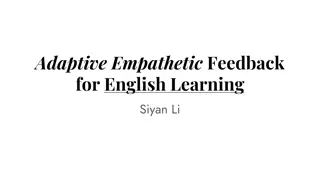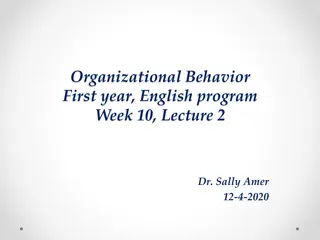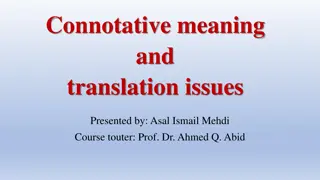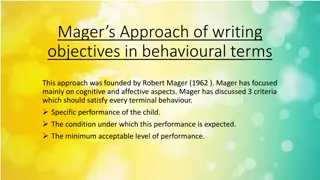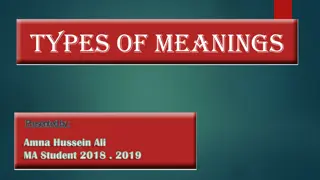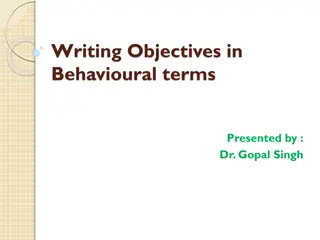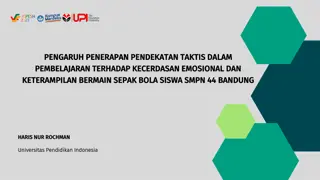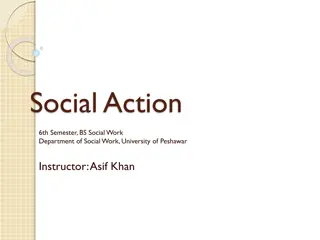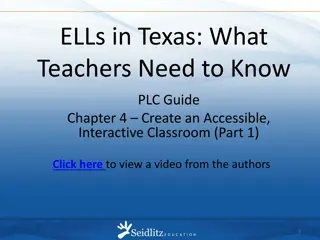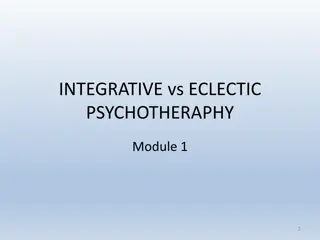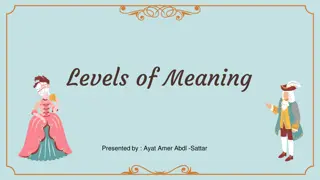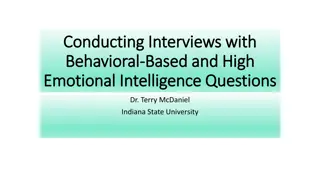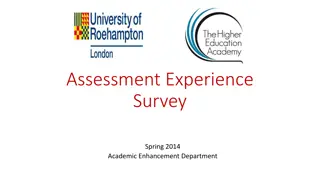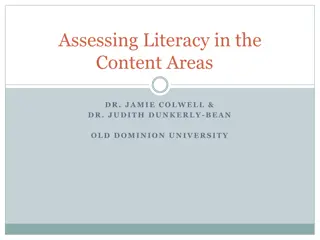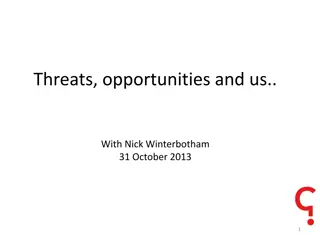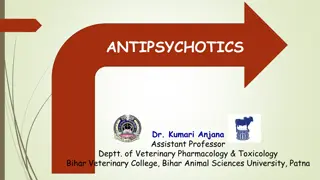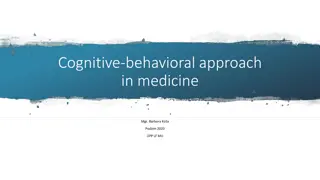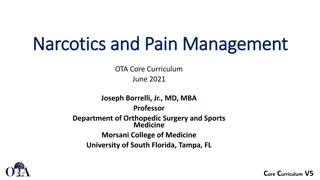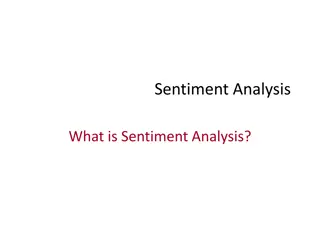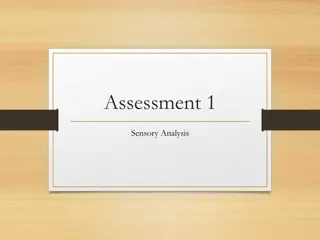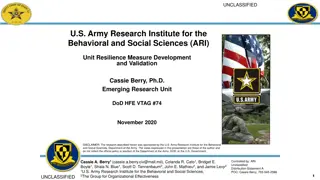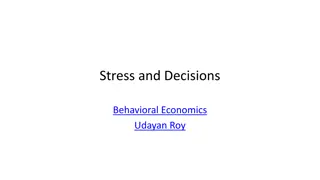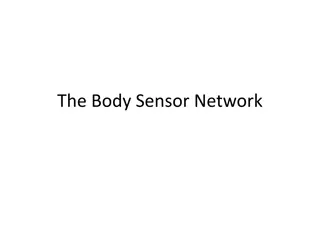Approach to Depression in Primary Care by Dr. Jon Davine
In this presentation, Dr. Jon Davine discusses the approach to depression in primary care, covering topics such as differential diagnosis, antidepressant medication selection, augmentation techniques, and treatment options like ECT and TMS. The sad state is explored through differential diagnoses, i
5 views • 56 slides
Understanding Attitudes and Job Satisfaction
Attitudes play a crucial role in shaping our feelings towards objects, people, or events, influencing our behavior and job satisfaction. Components of attitudes include behavioral, cognitive, and affective aspects. Cognitive dissonance arises from conflicting attitudes or behavior. Major job attitud
1 views • 17 slides
Enhancing English Learning with Empathetic Feedback System
Exploring the correlation between perceived teacher affective support and L2 grit in English learning, this research details the impact of an adaptive empathetic feedback system on students' motivation and frustration levels. By utilizing an empathetic chatbot system and negative affect detection, t
0 views • 22 slides
Understanding Emotional Labor in Organizational Behavior
Emotional labor involves employees expressing organizationally desired emotions during work interactions, impacting job performance. Employees may face emotional dissonance when projecting one emotion while feeling another, leading to surface or deep acting. Affective Events Theory (AET) suggests th
0 views • 19 slides
Understanding Attitudes and Job Satisfaction in the Workplace
Attitudes play a crucial role in job satisfaction, with cognitive, affective, and behavioral components shaping how employees feel about their work. Major job-related attitudes like job involvement, organizational commitment, and job satisfaction influence employee behavior and performance in the wo
0 views • 49 slides
Understanding Connotative Meaning and Translation Issues
Exploring the complexities of connotative meaning within texts, this article discusses the various types of connotative meanings and the challenges they pose for translation. It delves into attitudinal, associative, and affective meanings, emphasizing the importance of recognizing and preserving the
1 views • 17 slides
Understanding Bloom's Taxonomy and Educational Objectives
Explore the comprehensive concept of Bloom's Taxonomy and Educational Objectives developed by Prof. Benjamin S. Bloom and his associates. Learn about the cognitive, affective, and psychomotor domains, instructional objectives, and the interrelation of educational activities in shaping learners. Disc
1 views • 35 slides
Understanding Suggestopedia: A Humanistic Approach to Language Learning
Suggestopedia, an affective-humanistic approach to language learning, aims to eliminate negative feelings towards studying and boost students' confidence. By incorporating elements like posters, encouraging interactions, music, and student participation, this method emphasizes the teacher's authorit
0 views • 9 slides
Effective Strategies for Writing Behavioral Objectives in Education
Learn about Robert Mager's approach to writing objectives in behavioral terms, focusing on cognitive and affective aspects. Discover the criteria for defining terminal behaviors, explore action verbs for cognitive and affective objectives, and delve into impulsion, manipulation, co-ordination, natur
0 views • 6 slides
Types of Meanings Explored in Linguistics
Various types of meanings in linguistic communication are discussed, including conceptual, connotative, affective, and illocutionary meanings. These meanings play a crucial role in language structure and communication, helping us understand the complexity of language semantics and expression.
0 views • 26 slides
Understanding Behavioral Objectives in Education
Behavioral objectives in education are essential for effective teaching and learning. They provide clear direction on what students will achieve and how teachers can facilitate that learning. Different types of objectives, such as general and specific objectives, help in structuring educational goal
2 views • 13 slides
Crafting Effective Learning Objectives Using Action Verbs
Crafting measurable learning outcomes involves focusing on student behaviors, using specific action verbs, selecting appropriate assessment methods, and setting clear performance criteria. The checklist provided emphasizes the importance of observable and measurable outcomes, incorporating active ve
7 views • 27 slides
Impact of Tactical Approach on Emotional Intelligence and Soccer Skills in Junior High School Students
Study conducted at SMPN 44 Bandung investigated the effects of applying a tactical approach in learning on emotional intelligence and soccer skills of students. Results show a significant impact on both aspects, with recommendations for using tactical approach in teaching soccer to enhance cognitive
0 views • 7 slides
Understanding Types of Social Action According to Max Weber
Max Weber's sociology delves into the consequences of different types of social action, exploring how these actions can conflict and create tensions in society. Weber's typology categorizes social action into rational-purposeful, value-rational, affective, and traditional actions, highlighting the c
1 views • 10 slides
Enhancing ELL Instruction: Strategies for an Accessible Classroom
Explore practical strategies for creating an interactive and accessible classroom environment for English Language Learners (ELLs) in Texas. This guide covers key topics such as lowering the affective filter, providing comprehensible input, and making instruction more compelling. Engage in discussio
0 views • 7 slides
Leadership, Trust, and Crisis: Lessons from Central Europe Project
The project funded by multiple governments in Central Europe aims to advance sustainable regional cooperation. The initiative focuses on understanding leadership as a process involving trust, especially in crisis situations. The lesson structure includes case studies, discussions on resources, and e
4 views • 19 slides
Advancing Assessment in Education: Focus on Holistic Progress and Feedback
Embracing a shift in educational assessment, the focus is on promoting student learning and development through regular formative assessments. The NEP mandates emphasize competency-based evaluations, self-assessment, and interactive tools for student progress tracking. Holistic Progress Cards offer
1 views • 20 slides
Understanding Integrative and Eclectic Psychotherapy Approaches
Integrative Psychotherapy emphasizes treating individuals holistically across affective, behavioral, cognitive, and spiritual dimensions. It incorporates various theoretical perspectives like psychodynamic, client-centered, behaviorist, and cognitive therapies. Common factors in psychotherapy play a
3 views • 16 slides
Understanding and Beating Summer Blues: Tips and Resources for Mental Wellness
Learn about Summer Seasonal Affective Disorder (SAD), its causes, symptoms, and ways to overcome it. Explore professional mental health resources available to support you in managing temporary feelings of anxiety and depression during the summer months.
0 views • 12 slides
Exploring Affect Theory in Modern Society
Affect theory delves into the complexities of emotions and their expression in contemporary society, shedding light on the impacts of modern life on individuals. Through a lens of nonlinguistic forces, it examines the dynamics of power, culture, and social interactions, offering insights into the nu
2 views • 8 slides
Group Intervention for Women with Early Stage Breast Cancer
This group intervention program aims to build resilience and enhance various aspects of functioning for women with early stage breast cancer. The theoretical framework includes resilience, self-regulation, and cognitive-affective and social processing theories. The sessions cover topics like managin
1 views • 19 slides
Understanding Levels of Meaning in Language
Explore the concept of denotation versus connotation and delve into the various types of connotative meanings including attitudinal, associative, affective, and allusive meanings presented by Ayat Amer AbdI.-Sattar. Discover how words can carry multiple layers of meaning beyond their literal interpr
0 views • 16 slides
Coping with Winter Blues: Strategies for Children and Teens
Understanding the signs and symptoms of winter blues, seasonal affective disorder, and depression in children and adolescents is crucial. This comprehensive guide covers various issues faced during the winter season, ways to differentiate between normal blues and depression, unique symptoms in teens
0 views • 12 slides
Enhancing Emotional Intelligence Through Behavioral Interview Questions
Explore the key aspects of emotional intelligence, including social-emotional competencies and cognitive, affective, and behavioral competencies. Learn how to conduct interviews focused on emotional intelligence and discover the importance of relationships, self-awareness, responsible decision-makin
0 views • 44 slides
Assessment Experience Survey: University of Roehampton Students' Feedback
In a survey conducted at the University of Roehampton, students shared their assessment experiences and preferences. The survey revealed the distribution of undergraduate and postgraduate students, their age groups, and the assessment formats they have experience in. Students expressed interest in t
0 views • 16 slides
Understanding Effective Literacy Assessment Strategies
Explore various assessment purposes, including formative and summative assessment, affective and cognitive assessment, and strategic content literacy assessment. Engage in activities like T-Charts, SCLAs, and scoring methods to enhance student learning outcomes and teacher strategies.
0 views • 24 slides
Understanding Socio-Affective Development in Infants and Children
Socio-affective development focuses on how individuals interact with others and manage their emotions. It is influenced by factors such as personalities, morality, emotions, and spirituality. Attachment theory, proposed by John Bowlby, explains how infants form relationships with caregivers, startin
0 views • 16 slides
Insights on Learning, Innovation, and Growth in Modern Organizations
Explore a visual journey through various topics such as threats, opportunities, affective domain, learning preferences, new ideas cycle, and more. Discover key insights shared by experts like Nick Winterbotham and delve into the world of inspiring learning for all. Gain knowledge on learning process
0 views • 24 slides
Understanding Antipsychotics and Antidepressants in Veterinary Pharmacology
Antipsychotics and antidepressants play crucial roles in treating psychological and affective disorders in veterinary medicine. Antidepressants are vital in managing abnormal mood and behavior linked to depression, while antipsychotics help address various nervous disorders. The classification of an
0 views • 11 slides
Understanding Cognitive Behavioral Approach in Medicine: A Heuristic Perspective
Cognitive-behavioral approach in medicine, analyzed through affective heuristics and problem-solving heuristics, explores factors influencing decision-making processes and the dual processes theory. Key concepts include fast emotional reactions, reliance on emotion in judgment, reducing cognitive lo
0 views • 30 slides
Understanding Pain Management in Orthopedic Surgery
Pain management in orthopedic surgery involves reviewing pain pathways, mitigating pain transmission, understanding pain medications, and implementing multi-modal pain relief strategies. Pain is a complex and subjective experience with sensory, affective, emotional, and cognitive dimensions. Factors
0 views • 51 slides
Targeting Emotions to Facilitate Behavior Change in Older Adults
Efforts in changing health behavior have traditionally focused on social and cognitive factors, but recent evidence highlights the importance of affective states in decision-making and behavior change. Janey Peterson discusses the role of emotions in achieving and sustaining behavior change to benef
0 views • 11 slides
Understanding Sentiment Analysis: A Comprehensive Overview
Sentiment analysis, also known as opinion mining, is the process of evaluating written or spoken language to determine the positivity, negativity, or neutrality of the expression. It involves the systematic identification, extraction, and study of affective states and subjective information using na
0 views • 29 slides
Sensory Analysis Tests in Food Evaluation
Explore different sensory analysis tests used in food evaluation, including paired comparison tests for sweetness, quantitative descriptive analysis for taste attributes, and affective tests like hedonic tests. Understand the purpose and methodology of each test to enhance product development and qu
0 views • 12 slides
Structured Debriefing Guidelines for Healthcare Professionals
Learn about structured debriefing methods such as SHARP and setting learning objectives in healthcare practice. Understand how to address concerns, review learning points, and plan ahead for future improvement. Explore cognitive, affective, and psychomotor aspects to enhance performance and promote
0 views • 11 slides
Understanding Unit Resilience in the Army: Research Insights
Resilience at the unit level in the Army is essential for sustained performance and readiness. This research project, sponsored by the U.S. Army Research Institute, focuses on measuring and understanding team resilience components and their impact on overcoming stressors. The study aims to validate
0 views • 22 slides
Effective Advertising Message Strategies and Executional Frameworks
Exploring message strategies and executional frameworks in advertising, this chapter covers cognitive, affective, and conative approaches. It delves into the use of spokespersons and endorsers, principles of effective advertising, and various strategies like generic, preemptive, and comparative. Add
0 views • 24 slides
Insights into Decision Making and Behavior in Stressful Situations
Explore the impact of stress on decision-making processes through behavioral economics studies. Learn how stress can shift individuals from reflective to automatic decision states and how affective and deliberative systems influence choices. Dive into experiments by researchers like Dr. Baba Shiv an
0 views • 14 slides
Developing a Body Sensor Network Application for Identifying Affective Experiences and Craving for Alcohol
The project aims to develop an application that can identify affective experiences and physiological responses, particularly craving for alcohol. The application will differentiate between various mood states by collecting data which will be tested against a trained model. A system of survey schedul
0 views • 14 slides
Understanding Bloom's Taxonomy of Learning Domains
Bloom's Taxonomy, developed in 1956, focuses on promoting higher-order thinking in education. It categorizes learning into three domains: Cognitive (knowledge), Psychomotor (manual skills), and Affective (attitude). While Bloom's committee initially omitted the Psychomotor domain due to teaching lim
0 views • 19 slides


